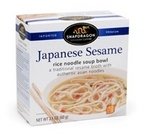Is JAPANESE SESAME SOUP BOWL Vegetarian?

Description
Rich, toasty flavor with a smooth, velvety texture; often described as mildly savory and warming. Commonly served as a starter or light meal, used for sipping, dipping, or pairing with noodles and rice. Reviewers note consistent taste, convenient single-serving portions, and authentic, comforting character, simple reheating and reliable portioning routines.

Description
Rich, toasty flavor with a smooth, velvety texture; often described as mildly savory and warming. Commonly served as a starter or light meal, used for sipping, dipping, or pairing with noodles and rice. Reviewers note consistent taste, convenient single-serving portions, and authentic, comforting character, simple reheating and reliable portioning routines.
Ingredients
RICE NOODLES: RICE, WATER. SEASONING: SALT, MALTODEXTRIN, SOY SAUCE POWDER (HYDROLYZED SOY PROTEIN, SALT), CREAMER (GLUCOSE SYRUP, PALM OIL, SODIUM CASEINATE), CANE SUGAR, DISODIUM INOSINATE, DISODIUM GUANYLATE, PEPPER, GINGER, GARLIC, ONION. SEASONING OIL: SESAME OIL.
What is a Vegetarian diet?
A vegetarian diet eliminates meat, poultry, and fish but typically includes dairy, eggs, and plant-based foods. People adopt it for ethical, environmental, or health reasons. This diet emphasizes fruits, vegetables, legumes, grains, nuts, and seeds as key nutrient sources. Vegetarians often get protein from eggs, tofu, beans, and lentils. It can offer health benefits such as reduced risk of heart disease and improved weight management, though attention should be given to nutrients like iron, zinc, and vitamin B12. With proper planning, a vegetarian diet can be both nutritionally complete and sustainable.
Similar Products
ORIGINAL MULTI-SEED CRUNCHY, BAKED CRACKERS WITH SESAME, QUINOA, FLAX AND AMARANTH SEEDS WITH A RICH AND SAVORY TASTE, ORIGINAL
Campbell's® Condensed Condensed Tomato Soup
MARUCHAN RAMEN NOODLE SOUP CHICKEN FLAVOR
Lipton Recipe Secrets Onion Recipe Soup & Dip Mix
Kikkoman Gluten Free Panko Japanese Style Bread Crumbs - 8oz


